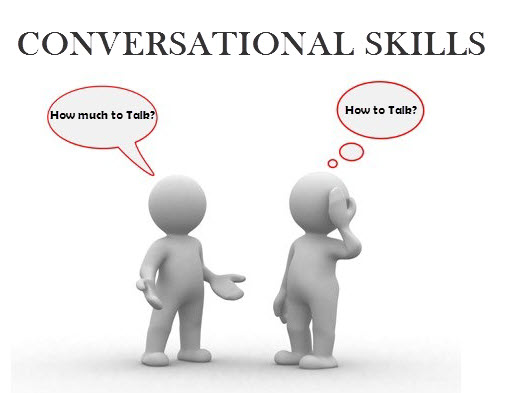A conversation is a spontaneous interaction between two or more people. We all have conversations with family and friends.However, many of us, may be labeled as “boring” if we make long and meaningless conversations. How adept are we in our conversational skills ?
A good conversationalist “goes with the theme”. If everyone is discussing movies, it would be a good idea, to stick to the topic. Do not go off on a tangent and introduce a topic of your own. Contribute your view points and go with the mood. If it is a fun topic, do not butt in and make it serious. For example, do not become serious and argumentative by theorizing and defending you own point of view. Laugh with the others and present your point of view without either getting offended or offending others.
Do not interrupt a free flowing conversation between others .Wait for the conversation to end and see if the others are looking at you indicating that you can participate. Sometimes, they may be discussing something private and do not want you to participate. In that case, apologize that you perhaps came in at the wrong time and ask if you can sit around or if they want you to leave. If this is a conversation that you really want to join in, then seek permission. Again, give your point of view but do not get into a disagreement. If someone disagrees with you, you can back off smiling, saying that you beg to differ. You need not insist on your take on the subject, neither do you need to change your viewpoint to suit others.
It is easier to have conversations within a group of people you know. Yours might be a talkative family, a loud group of friends or just the opposite. You would of course fit into your comfort zone. You may be a talkative person or a quiet one and your friend and family accept you as such. However, a good conversationalist knows how to hold a conversation in an unfamiliar zone. Also, a new friend or a new member of the family should be introduced to the rest of the crowd and gently initiated into the conversation. For example, you can tell them what the conversation is about and introduce the others to him or her. Also, you can tell the others to make the other person comfortable by not talking family secrets or cracking private jokes which only the group is familiar with.
Does the thought of starting a conversation with a new person or a group worry you? It might be your first day in a classroom or at work; it could be at a party, workplace or even in a bus, train or plane. You might meet someone for the first time that you are forced to interact with. You could intitiate a conversation by introducing yourself or a topic. On the other hand if someone initiates a conversation, do not get frightened and shy away. You could respond in the same manner.
Determine whether it is a personal interaction or an impersonal one. For example, if you have just met a person at a railway station it may be possible to have a good ten minute conversation. You may be surprised at the topics you can talk about-- train timings, comforts in the train, other trains, convenience at the railway stations or even the railway minister---without ever divulging your name! Too much information need never be exchanged---for example, you might mention that you live in Kolkota on Park Street but there is no need to mention the full address. There is no need either, to talk about your family, siblings, where they live, study etc.Remember, you are talking to a stranger and it is not a good idea to reveal too much. At the same time, do not ask too many questions out of curiosity. The other person may just shut you off.
If you meet someone in a familiar zone and you need to maintain a long term relationship with him or her, you can introduce yourself and reveal your name, ask for their name and some other details. Again, do not reveal nor seek more information the first time. Take at least three to four conversations to get to know more about the other person. Do not ask all the questions at the same time. If you feel that the other person is shy draw him or her into your conversation by finding out their area of interest. Do not get put off if the other person seems to be too reserved. Let them be. When they realize that you are not pushing them, they might get more comfortable with you.
When in doubt, talk about the weather: you can never go wrong there!

Thanks for the post Avigna,these are all great skills to facilitate connection. I might add that a successful conversation is one in which you show up in bona fide way.
ReplyDelete
ReplyDeleteI just want to say thank you for sharing this post, it was really awesome and very informative. Thank you.
OET Coaching in Adelaide
Best OET Coaching in Adelaide
OET Coaching for Nurses in Melbourne